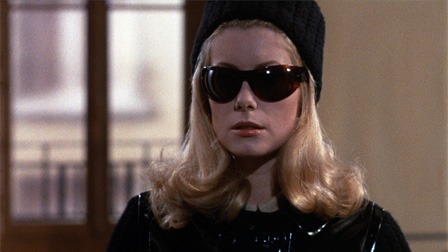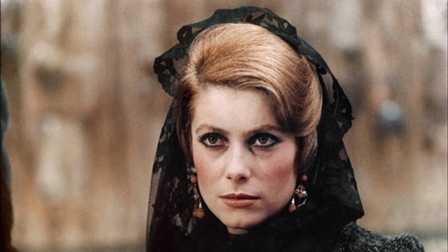By Film Noir Blonde and Mike Wilmington
The Noir File is FNB’s guide to classic film noir, neo-noir and pre-noir from the schedule of Turner Classic Movies (TCM), which broadcasts them uncut and uninterrupted. The times are Eastern Standard and (Pacific Standard).
PICK OF THE WEEK: Two by Luis Buñuel as part of Catherine Deneuve Day
“Tristana” (1970, Luis Buñuel). Monday, Aug. 12, 10 p.m., (7 p.m.).
“Belle de Jour” (1967, Luis Buñuel ). Monday, Aug. 12, 2:15 a.m. (11:15 p.m.).
The most beautiful movie actress alive paired with the most brilliantly rebellious filmmaker.
That was the incendiary match-up of star Catherine Deneuve and director Luis Buñuel – who were most famous for their 1967 French erotic drama “Belle de Jour.” In that great film, Deneuve – so lovely and so classically, radiantly, sexily blonde that she took up residence in male dreams forever – played Severine, a Parisian wife, who becomes a prostitute during the day to escape her boring bourgeois life and her handsome but boring husband (Jean Sorel). Severine then falls into a world of crime, hypocrisy, dreamlike perversity and peril. It was the most popular, and the best-remembered, film of Buñuel’s entire career.
But they made another film that Buñuel preferred and is one of his most personal: “Tristana” (1970). Shot in Spain, based on a novella by famed author Benito Perez Galdos (adapted by Buñuel and Julio Alejandro), this not underrated but definitely underseen film starred Deneuve in a role just as alluring and frightening as the wayward Severine: Tristana, the young orphan seduced, exploited and virtually imprisoned by her guardian Don Lope (Fernando Rey). Don Lope, worldly and egocentric, is an aristocrat of radical political beliefs, whose desire for his ward undermines his ethics – even as Tristana, a seeming victim, turns exploiter herself and exacts a terrible revenge.
“Tristana” is a masterpiece, but it’s also a grimmer, sadder, more psychologically disturbing picture than “Belle de Jour.” Buñuel, notorious for his audacity, has directed some of the cruelest scenes in cinema, in films like “Un Chien Andalou,” “Los Olvidados” and “Viridiana.“ But he never filmed a more wounding scene than Tristana on the balcony: a sequence that delighted no less an epicure of sadism than Alfred Hitchcock. “Tristana! That leg! That leg!” Hitch exclaimed when the two directors met at a party. Buñuel probably only smiled.
Other Deneuve Day highlights include: “Repulsion” (1965, Roman Polanski), “Mississippi Mermaid” (1969, François Truffaut) and “Un Flic” (1972, Jean-Pierre Melville). See TCM for the full list. Films are in French (“Tristana” in Spanish) with English subtitles.
Friday, Aug. 9
4 p.m. (1 p.m.): “Bullitt” (1968, Peter Yates). With Steve McQueen, Jacqueline Bisset and Robert Duvall. Reviewed in FNB on October 27, 2012.
Saturday, Aug. 10
1 p.m. (10 a.m.): “The Postman Always Rings Twice” (1946, Tay Garnett). With Lana Turner, John Garfield and Cecil Kellaway. Reviewed in FNB on October 11, 2012.
Sunday, Aug. 11
3:15 p.m. (12:15 p.m.): “The Wrong Man” (1956, Alfred Hitchcock). With Henry Fonda, Vera Miles and Anthony Quayle.












From FNB readers